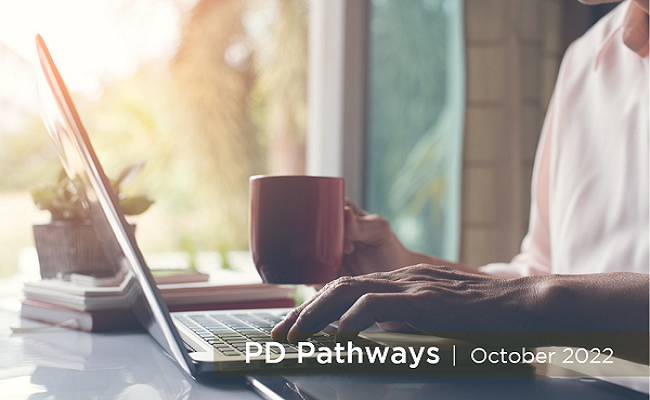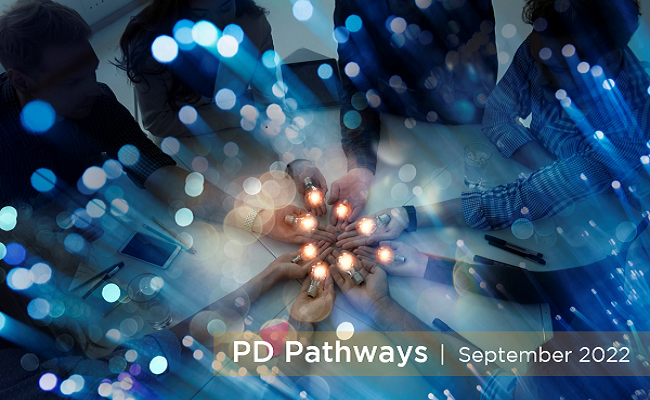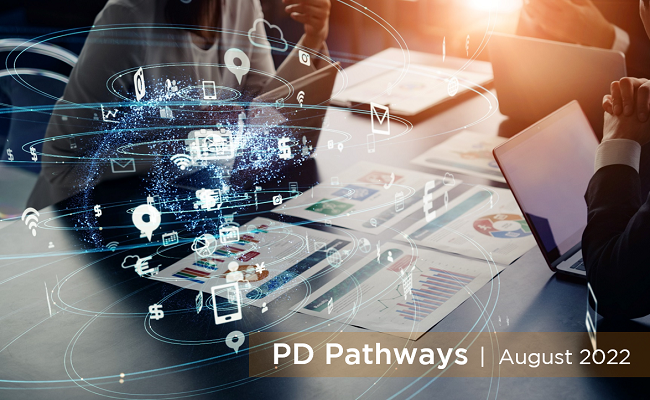[Set Slide Image]
PD Pathways
PD Pathways is a monthly digital newsletter for CPAs and business professionals, showcasing the latest news and resources in CPABC Professional Development.

8 Biases + Heuristics Impacting the Return to Office
By Robin Rosebrugh
The following is an excerpt. The full article can be found in LinkedIn.
When employees don’t feel a sense of community or strong social ties with people at work, they are more likely to consider leaving the organization. For organizations to transition to hybrid work, the leaders need to understand the behavioral biases that may make it harder for employees to leave the comfort of their homes.
Over the last few years, many people may feel like they have lost a lot of their personal freedoms. Working from home, learning new technologies, wearing masks, and distancing from friends and community were mandates in many regions. Not choices. This led to many employees making choices where they could: whether to work in their pajamas or get dressed, whether to work from the sofa or the kitchen table, whether to start work at 7 am or 9 am, etc. As organizations ask their employees to come back to the office, employees still want choice and control over how and where they work. The difficulty is that employees are experiencing the endowment effect. Having acquired this freedom of working from home, they place greater value on it without recognizing the opportunity costs. Employees are focused on what they may lose when they are no longer able to work from home 100% of the time rather than on what they might gain from returning to the office a portion of the time. Not only are they focused on the perceived losses, but they are also inflating the value of the losses over the potential gains of returning.
Research has shown us that we gain immense value when collocated with teammates. We build social capital, build trust, and share knowledge and ideas. Many of which then mediate innovation which is necessary for growth in our fast-paced, ever-changing world. An intervention to overcome the strength of the endowment effect would be to have all employees come together for an offsite multi-day gathering. This meeting would allow employees to reconnect to the sense of community and belonging that occurs when spending time face to face with peers. When the salience of collocation benefits is high, employees can more rationally compare the value gained from returning to the office to the value of working from home.
Unfortunately, the media is complicating the decision-making as well. The constant stream of fresh media articles touting the benefits of working from home feeds the availability heuristic of employees and often the confirmation bias as they select which articles to read. The availability heuristic leads to decision-making based on readily available or salient information, which is currently skewed towards working at home and complete freedom over choosing where and how to work. Often, when people are already leaning towards a decision, they will select to read the information that supports their position rather than understand all potential choices. Confirmation bias distorts our evidence collecting to confirm our existing beliefs rather than collecting unbiased information.
As employees have started trickling back to the office, they have found that they are returning to an office with a very low social density. If the value of the office is spending time with other people, we need to ensure that there will be other people there. Two commitment strategies that could help revolve around financial incentives and social pressure. The number one reason employees say they would prefer to work from home is the commute. If the home becomes the default place to work, employers may consider compensating employees to drive to the office, especially with our current soaring gas prices. The second commitment strategy involves social pressure, which would come with how knowledge is shared around who is in the office and when. Employees could see the quarterly plan for their peers and plan to show up on days when most of their team is in the office. They would also be encouraged to have an office buddy that they overlap with at least one day each week. Studies have shown that having strong social ties with a colleague leads to greater employee retention Employees come to the office to be around other people, so knowing when others will be there will facilitate more attendance.
Once people are returning to the office, another method of addressing the ‘home is freedom’ endowment effect is to provide choice and control over where and how people work within the office. There should be spaces for collaboration work with collocated colleagues, spaces to collaborate with remote colleagues, social spaces, focus spaces for both heads-down work and private enclaves for virtual meetings, and rejuvenation spaces. The office needs to be compelling – they can’t just be returning to the office they left before the pandemic.
Managers who have only managed employees within spatial proximity struggled during the work from home mandate. As managers return to the office, both proximity bias and in-group bias may impact how they treat their employees. They may provide preferential treatment to the employees within their shared proximity. If a group of employees spend more time in the office, the manager may identify as part of that group, whereas employees who choose to spend more time at home would be in the out-group. This in-group bias could happen in reverse for a manager who works from home and sees the employees who work from home as their ‘in-group’. When we self-identify as being part of a group, we treat people in that group better than others.
A simple intervention to overcome the in-group bias is a linguistic one. Employees are told that they all have ‘flexible working arrangements' and that nobody is an ‘in office employee’ or a ‘work-from-home employee’. In addition to the working arrangements, the organization can invest in their company culture to have everyone identify with the organization, increasing their sense of belonging to a single group. Belonging is a fundamental human need and one of the reasons why people say that they will want the office as a place to gather.
Like managers, employees may also be feeling a binary bias between working from home and returning to the office. These feelings are connected to the ambiguity of the hybrid work environment. When an option is unknown or uncertain, we tend not to consider it because of the ambiguity effect. Employees have been working from home for two years. They may have been working from the office for decades before that – another experience that they know the outcomes of. However, the idea of hybrid working is a novel experience for many people. One that employees are uncertain how it will work or what the outcomes will be. This uncertainty prevents employees from giving equal weight to the options when deciding between working from home 100% and hybrid working.
Understanding the biases and heuristics that subconsciously impact our decision-making helps us address them. We are steeped in a time of great uncertainty. Yet organizations are feeling the pressure to make a decision about encouraging their employees to return to an office, either full or flextime, or whether they get rid of their lease altogether. Many organizations succumb to status quo bias by defaulting to what they were doing before the pandemic and bounded rationality by choosing an option that is ‘good enough’ for right now. As organizations select the hybrid approach to return to work as a ‘good enough’ or middle ground, they must address the many biases and heuristics that prevent this change for their employees and the management team. When the organizations can find a balance between flexible working arrangements and intentional gathering, they may find the sweet spot that allows them to gain the benefits of a global team with the deep trust, culture, and knowledge sharing of a hometown office.
Robin Rosebrugh, B.SC., CSBA, LEED GA has been integrating her love of research and design for over 10 years, while communicating to professionals about the impacts that our spatial experience has on our individual and group behaviors.
Prior to attending BCIT for Interior Design, she completed her Bachelor of Science from UBC and was awarded an NSERC grant to study neurodegenerative diseases. She has a strong passion for continually developing her education, specifically focusing on the influence that our designed environment has on our behaviors and wellbeing which has led her to pursue her Master’s degree in Organizational Psychology through Harvard University.
Listen to Robin in person as she delivers her breakout session on Reimagining the Office for Hybrid Work at our upcoming PD Nexus: Business Insights and Innovation Insights on December 7 at the Hyatt Hotel in Vancouver.

In-Person Seminars
Check out our website for approximately 50 titles scheduled for in-person delivery this fall. Here are some sessions that will be delivered in November and early December. We hope to see you there!
Taxation of Domestic Trusts - Advanced
This seminar covers tax issues surrounding family trusts, with a focus on complex tax planning opportunities and tax traps. Issues are discussed in both the inter vivos and testamentary context.
Vancouver (Nov 17)
Read more on Taxation of Domestic Trusts - Advanced
Wiring Your Brain for High Impact Leadership
The brain has everything to do with who we are and what we do, and leadership is all about influencing who we are and what we do. Explore brain engagement and learning to lead with the brain in mind.
Vancouver (Nov 23)
Read more on Wiring Your Brain for High Impact Leadership
Income Tax – Everyday Issues for General Practitioners
For practitioners who deal with small and medium-sized owner-managed businesses, this seminar identifies income tax matters that practitioners frequently encounter and demonstrates how income tax rules apply in everyday situations.
Victoria (Nov 15), Prince George (Nov 29)
Read more on Income Tax – Everyday Issues for General Practitioners
Income Tax – Update 2022
Providing a high-level summary of tax law changes in the past year, this seminar examines current changes and relevant issues in taxation that affect individuals and most businesses in the private sector.
Surrey (Nov 8), Victoria (Nov 16), Burnaby (Nov 17), Vancouver (Nov 24), Prince George (Nov 28)
Read more on Income Tax – Update 2022
Compilation Engagements - Application of CSRS 4200 New Standard
Practitioners will get updates on the new standard for compilation engagements so that they will have a working knowledge of the standard for application in their practices.
Vancouver (Nov 15), Richmond (Nov 25)
Read more on Compilation Engagements - Application of CSRS 4200 New Standard
Income Tax - Owner and Manager Compensation
This seminar provides participants with a working knowledge of the tax effects of the use of salary and dividends as compensation to owner-managed business from both the shareholder and corporate perspective.
Vancouver (Nov 25)
Read more on Income Tax - Owner and Manager Compensation
Excel Financial Models and Analysis
This hands-on workshop will provide you with the skills to build financial models for use in decision-making, analysis and forecasting. You will also work with the many BI features in Excel for reporting and presentation.
Vancouver (Dec 6)
Read more on Excel Financial Models and Analysis
What's New in PD
Here are just some of the new seminar titles we have added to our PD Program this fall.
Why Successful Companies Fail: Forewarned is Forearmed
Not recognizing when the fundamentals of business have changed borders on corporate inertia and negligence. With the right tools and a different understanding of volatility, disruption and uncertainty, decline is not inevitable.
Live Webinar (Nov 8)
Read more on Why Successful Companies Fail
ASPE - Agriculture (3041) New Standard
This seminar will highlight the key aspects of the new Canadian ASPE accounting standard for agriculture as it applies to the unique characteristics of agricultural inventories and productive biological assets.
Live Webinar (Nov 10)
Read more on ASPE - Agriculture (3041) New Standard
Disruption and Risk: The New World for Financial Managers
The world is changing quickly. You need to keep ahead of the curve. This seminar looks at contemporary issues of vital interest to financial managers.
Vancouver (Nov 18)
Read more on Disruption and Risk: The New World for Financial Managers
ASPE - Revenue Recognition 3400
This course addresses challenges faced by preparers of ASPE financial statements and practitioners with respect to the recognition, measurement, presentation and disclosure of revenue transactions under ASPE.
Live Webinar (Nov 28-29)
Read more on ASPE - Revenue Recognition 3400
Ethics Seminars
Need ethics hours for 2022? Here are your upcoming ethics sessions offered in November and December. Each offering contains four eligible ethics hours.
Professional Ethics for Career & Life Success - Good for Business and the Right Thing to Do
This hands-on, participatory workshop will guide you through several classic ethical frameworks and supply you with practical tools and techniques you can use to maintain high standards of ethics in your work and on your team.
Live Webinar (Nov 19)
Read more on Professional Ethics for Career & Life Success
Ethical Leadership in an Age of AI
Explore recent advancements in AI and how it can be expected to change our CPA roles. We’ll evaluate the ethical implications when facing challenging AI-related decisions, by framing these decisions in the context of the requirements of the CPA Code of Professional Conduct.
Live Webinar (Nov 21-22, Dec 10, Dec 19)
Read more on Ethical Leadership in an Age of AI
Understanding and Embracing Ethics in the Workplace
This session provides an opportunity to challenge and uncover what “ethics” means in a professional context and how our goals, values and traits drive our responses in times of conflict and stress.
Live Webinar (Nov 23, Nov 25), Vancouver (Nov 30)
Read more on Understanding and Embracing Ethics in the Workplace


Making headway in your career – what’s next?
Is it time for an upgrade? You have been given more supervisory and decision-making responsibilities - maybe it is time to enhance your leadership and critical thinking skills. According to this Harvard Business School article, successful and effective leaders consciously invest time and energy to develop key skills that empower them to lead others.
Here are some useful leadership skills that may help you advance your career.
Managing change
There is no avoiding it – change and transition are inevitable in any work situation, both for you and for those you lead. Knowing how to deal with change more effectively can help reduce stress, maintain employee morale and enhance your competitive edge. Learn more about how you can manage transitions and lead the people side of change.
Prioritizing essential skills
If you are relatively new as a manager, consider getting more exposure to formal training in leadership. Discover all the essential areas that new managers typically need to focus on in order to transition to that leadership role more effectively. Learn more about the essential skills you need as a manager.
Communicating with difficult people
As a manager, you will encounter situations or individuals that may be difficult to deal with. Knowing how to defuse emotion and explore self-management tools that can help you address problematic behaviours can increase the likelihood of a positive and productive resolution. Learn more about tools for communicating with difficult people.
Controller as leader
Finance professionals who are either transitioning to a controllership position or are new to the position should consider how they can add value to their organizations by becoming a more strategic leader. Reflect on your own competencies - working effectively with people in all stages of their own careers, enhancing your emotional intelligence to lead others, and addressing your ability to handle change and crisis. Learn more about bringing strategic leadership to the controller role
Connecting with your team online
A relatively new challenge, virtual meetings can sometimes lead to unclear communication, disengagement, and frustration. As a leader, you are in a position to improve online facilitation with your team, and serve as a role model on how virtual meetings can be more inclusive and effective. Learn about running better online meetings


A Highly Acclaimed Industry Expert
Meet Karine Benzacar, MBA, FCPA, FCMA, CPA (US), CFA, a seasoned industry professional with over 20 years of industry experience.
.png) After beginning her career in the finance departments of Avon Products and Kraft Foods, Karine held Senior Management positions at three major Canadian Banks – Royal Bank of Canada, Bank of Nova Scotia, and Bank of Montreal. Her career has spanned many functional areas including accounting, finance, capital markets, project management, re-engineering, and strategic management. She has performed consulting work, developed financial courses, and trained thousands of professionals from a wide variety of industries.
After beginning her career in the finance departments of Avon Products and Kraft Foods, Karine held Senior Management positions at three major Canadian Banks – Royal Bank of Canada, Bank of Nova Scotia, and Bank of Montreal. Her career has spanned many functional areas including accounting, finance, capital markets, project management, re-engineering, and strategic management. She has performed consulting work, developed financial courses, and trained thousands of professionals from a wide variety of industries.
Karine has been teaching for the Smith School of Business at Queens University since 2010. She is also Managing Director of Knowledge Plus Corp., an organization which specializes both in business training and in providing financial, accounting, and management information services. As a professional accountant, certified both in Canada and in the U.S., Karine’s practice has involved organizations all across North America. Her clients include many companies, such as the Bank of Nova Scotia, Magna, and IBM, start-up firms and the public sector, such as various departments of the Government of Canada.
Karine has also published numerous articles in leading journals such as the National Post, Financial Post, CMA Management Magazine, HR Reporter, HRPA Magazine, Bottom Line and the RMA Journal and has been quoted as an industry expert in industry publications.
With an overall instructor rating of 4.65 out of 5, here are what past participants have to say about their seminar experience with Karine:
“Really enjoyed Karine's presentation. This was a long day but her enthusiasm kept my attention. I would definitely take another course with her as the instructor.”
“Very capable instructor, a lot of real life experience that are applicable. It is always important for an instructor to have that real life experience in the work place to make things more convincing, and Karine has that.”
“Excellent and depth of knowledge. She really has a passion for what she does.”
“Very knowledgeable instructor. Interactive. used practical examples.”
Register today and learn from Karine at one of her upcoming sessions on Treasury and Finance for Accountants, Costing and Probability, Advanced Financial Statement Analysis, Powerful Financial Analysis and Taking Financial Statement and Ratio Analysis to the Next Level .

Free On-Demand Seminars
Missed the live virtual offering for one of our most recent free sessions? Don’t despair, you can register for the on-demand version instead. These titles are eligible for verifiable CPD hours – in order to claim these hours as verifiable, you will be required to successfully complete a short quiz.
Cybersecurity: A Risk Management Perspective
This course will show you how to roadmap your organization’s cybersecurity programs using a risk management approach, and why cybersecurity is often the responsibility of financial professionals.
Fraud Prevention for Professionals
This seminar is geared towards anyone interested in protecting themselves and their businesses from fraudsters, and those who want to learn how to recover funds if they have been a victim of fraud and how to protect their identity going forward.

PD Pathways
Reminder
There is still time for you to register for the following PD Nexus Days:
Did You Know?
The Optimal Negotiator: The Definitive Program for Serious Deal Makers will be held online on March 7-9 & 21-23, 2023.
Negotiating is a delicate mix of art and science, of style and substance. Knowing how to encourage adversaries to accept your point of view while seeing themselves as winners is crucial to your success and the prosperity of the enterprise you lead. Register for this live virtual offering and master the art of negotiation.



